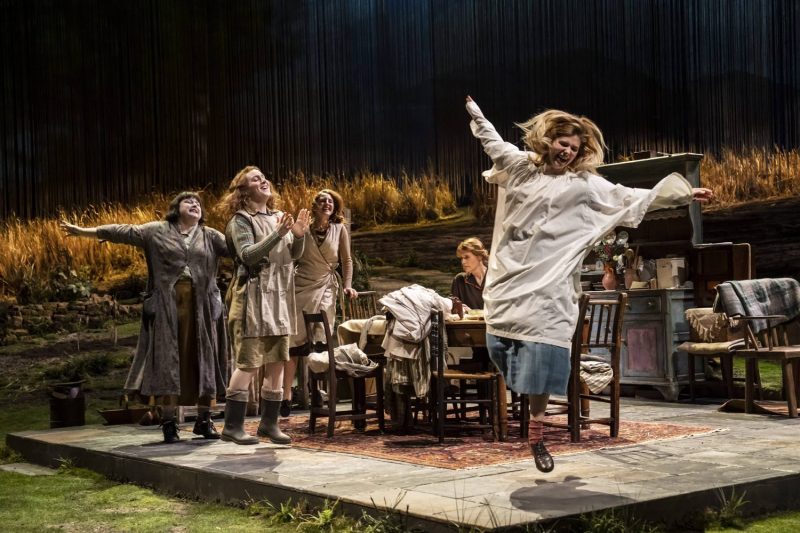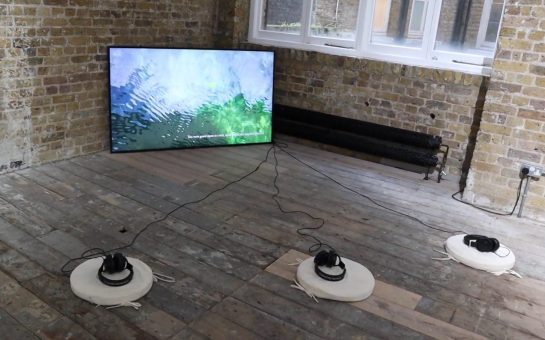Over thirty years on from where it was first played in 1991, Josie Rourke’s revival of Brian Friel’s Olivier award-winning play is back at London’s National Theatre, with a truly remarkable cast.
It’s early August 1936 in Ballybeg, County Donegal, a fictional town created by playwright Brian Friel. In a fatherless, motherless and husbandless cottage, the narrator, Michael (Tom Vaughan-Lawlor), opens the production by revealing that what we are about to see is a distant summer memory from his childhood. He is shadowed by a golden, hazy, idyllic setting with a winding path that looks like it just might lead to Oz.
Transported to the time of the Celtic harvest festival Lughnasa, Michael is seven years old and spends much of his time as an observer of his mother Christina (Alison Oliver) and her four older sisters navigating a changing, modernising Ireland.
A quiet opening very quickly bursts into Josie Rourke’s joyous revival that audiences have been waiting for, with bustling, boisterous energy and noise erupting from the five sisters: Rose (Bláithín Mac Gabhann), Agnes (Louisa Harland), Maggie (Siobhán McSweeney), Kate (Justine Mitchell) and Christina. They are caring for their brother Jack (Ardal O’Hanlon), who has recently returned to Ireland after working in Uganda as a missionary, and is recovering from malaria.
While they may live under one roof, each sister has their own unique set of circumstances. Collectively however, the sisters are battling poverty – Kate, the eldest, more shrill and highly-strung sister, executed wonderfully by Mitchell, acts as the maternal figure and is also the breadwinner of the family as a teacher at the local school, a job she later loses.
Agnes and Rose make little income through knitting gloves, whereas Maggie acts as the main homemaker and meditator, and Christina, the youngest of the sisters, also has no job (which in turn makes her highly sensitive to generosity from others) and is raising Michael as a single mother. Michael’s father Gerry Evans (Tom Riley), is an unreliable salesman who intermittently returns, unannounced, to see Chris and Michael.
Dancing is indeed at the heart of the story, and whether that’s around the kitchen where the wireless radio is a centrepiece, or around the garden, the sisters are always yearning to dance. Accompanied by joyful Irish music, it’s evocative of their togetherness and longing, as certain forces of change are fast encroaching; the Industrial Revolution and Paganism versus Catholicism.
This incredible ensemble captures the true essence of sisterhood with all its trials and tribulations, indeed with some exquisite facial acting as the sisters ache for a fuller life, while being anxious about the world changing around them.
There are frequent unspoken moments of fragility throughout, exemplified further through their reminiscing of people they went to school with, or past suitors. With probably no surprise, McSweeney steals the limelight as the utterly hilarious, sharp-witted and emotionally astute Maggie.
It’s worth bearing in mind that this story is more of a character and societal examination as opposed to a fast-paced show with ground-breaking events. The play is set in the cottage and garden with other events and characters only described. In parts, it may feel slightly slow moving, but it doesn’t make it any less pleasurable to watch.
I was particularly fond of the softer subtleties in certain relationships, for example, Agnes’ apparent feelings for Michael’s father Gerry Evans. Only Margaret appears to recognise Agnes’ true feelings, and while Christina may observe their mutual fondness for one another, she chooses to ignore it.
Additionally, we see Rose become a shell of herself – in the second act her once bright eyes become drawn and lost. After she meets Danny Bradley, it is strongly implied through the bilberry stain on her clothes, that Rose has lost her innocence.
Agnes and Rose’s relationship is particularly special: after a factory opens in Ballybeg and makes their knitting business redundant, Michael reveals that Agnes dedicated her life to caring for Rose after they leave the cottage, without a trace, for London.
Rourke’s show is certainly one of ambivalent joy. Undeniably, it’s a celebration of sisterhood, strength and family life and with such a witty delivery, it’s easy to forget that it’s also profoundly heart-breaking. The vibrant Mundy sisters are ultimately trapped in a society that cannot offer them the opportunities they very much deserve.
At the Olivier Theatre, National Theatre, London, until 27 May.
Featured image credit: Johan Persson/ National Theatre





Join the discussion